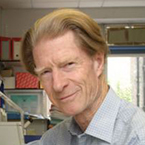
Internationally acclaimed for a body of work that has revolutionized thinking on how cells develop, Dr. Gurdon was awarded the 2012 Nobel Prize in Physiology or Medicine for the discovery that mature cells can be reprogrammed to become pluripotent. Over 50 years ago he demonstrated that the nucleus of a mature somatic cell from a tadpole could be transplanted into a frog ‘s egg and the cell nucleus would be reprogrammed to develop into a cloned frog. This discovery led to years of research on the phenomenon of reprogramming and has major implications for a variety of diseases, especially lung disease.
In addition to his work on nuclear transplantation and reprogramming, Dr. Gurdon has studied the use of Xenopus eggs and oocytes for mRNA microinjection and analyses of signaling factors in normal development. The tools he developed for nuclear transfer and the use of oocytes continue to be widely used. His current research seeks ways of obtaining embryo cells from the cells of adults, with the goal of producing replacement cells for the same individual.
Career Highlights
2012 Nobel Prize in Physiology or Medicine
2009 Albert Lasker Basic Medical Research Award
1995 Knight Bachelor
1990 Elected Foreign Associate, French Academy of Sciences
1989 Wolf Prize in Medicine
1987 Emperor Hirohito International Prize for Biology
1985 Fullerian Professor of Physiology and Comparative Anatomy, Royal Institution
1985 Royal Medal, The Royal Society, London, United Kingdom
1984 Priz Charles Leopold Mayer, French Academy of Sciences
1983 Elected Foreign Member, American Philosophical Society
1980 Elected Foreign Associate, National Academy of Sciences, Washington, DC
1978 Elected Foreign Honorary Member, American Academy of Arts and Sciences
1977 Paul-Erlich-Ludwig-Darmstaedter Prize
1971 Fellow of the Royal Society
1960 D.Phil., Oxford University